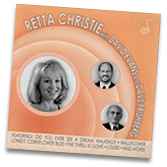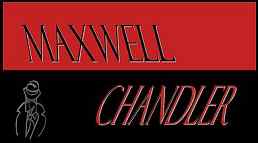
| Maxwell's page twenty-three. | ||||||||||
Charmed and Blue: Retta Christie with David Evans and Dave Frishberg

Jazz at its best has an in the moment spontaneity which is fed in equal parts by the feel/mood of the artists, audience and venue. Another equally compelling aspect of jazz has been its ability to draw from divergent sources to create a single piece of work.
The new album by vocalist Retta Christie is one of the best recent embodiments of this ethos. It is a trio date with Retta doubling on brushes and David Evans on saxophone and clarinet. Composer/pianist/vocalist Dave Frishberg is heard here solely on piano.
Country, country swing and that brief time frame when hot jazz was morphing into what would become the big band era have in common the fact that none of them in their initial conceptions were as rigid in defining what would constitute their over all make up as would happen a few years down the line. Lack of restrictions, when harnessed correctly, can make for a stimulating freedom. This album mirrors and embraces those bygone possibilities.
The songs, mostly culled from the 1920’s and 1930’s incorporate to varying degrees, elements of country swing, (hot) jazz and saloon songs. Each song utilizes elements from these genres but within each song the proportion of inspiration culled from these musical sources varies. For me, part of the appeal of this album is that it transcends standing firmly in one genre.
From the opening lines of “Cheatin’ on Me,” Retta’s perfect diction is made apparent . A singer with great technique, she never sounds as if she is “slumming it” by singing music which does not demand blatant virtuosity in its execution. Repeated listenings to this album actually made me even more impressed with her delivery possessing, as it does, a seemingly casual grace.
The piano has almost stride-ish brakes which do not sound contrary to the main country swing cadence of the song. On saxophone David has a warm ethereal quality, building off of Lester Young as he was in his salad days of the pre-fragile beauty he later embodied.
Often new recordings of the older period/genre, specific music lapses into a kitschy lightweight version but here all three artists convey a great authenticity for the music. To strive for too much authenticity can be a trap too, as the players may be able to play a piece as it had been played but then when it is time to inject a bit of themselves into the mix they are left with the choice of playing something which, being birthed from the experiences of a different era sounds wrong or to play completely in the pieces style becomes a pantomime of something under museum glass. Because of the elusive nature of this album’s genre, this never becomes an issue.
“Wallflower Lonely, Cornflower Blue” is an original by Dave Frishberg from the 1960’s. It easily strolls across several genres using the blues as its foundation as if there were a late night gin joint in the basement of the Grand Ole Opry. Billy Holiday used her voice more like a musician than a singer, Ben Webster knew the words to every song he ever played. In that same vein, Dave’s piano playing for the entire album shows that he could have easily been known primarily as a great accompanist. Being a singer himself has made him intuitively know the spot on colorations with which he fills the album.
A new trend which I have noticed being utilized by artists on smaller labels is forgoing the digital perfection which studios today offer. The digitally perfect music is often accompanied by a certain coldness which gives the feeling of musicians like goldfish in their tiny glass containers recording their parts. This album has a fun, loose but never sloppy feel which is evidenced by the interplay of the band and also put forth by the ambient warmth to be heard. Throughout the sound is very good, to have had it pristine would be to freeze dry music of this type.
“Louise” is another favorite track of mine. Here, this tune from 1929 is taken as an instrumental. On this piece as well as others Retta can be heard on brushes. With her brush playing, she is actually rather good, no percussive dilettante. As subtle as her brushwork is, it does provide a snappy forward motion to the piece. Nowhere on the album does her brushwork come across as mere sonic grout to fill in aural space. Dave’s piano work here also shows a percussive aspect, the perfect dance partner for mademoiselle brushes. David’s sax is a study in romanticism tinged wistfully blue.
Although two members of this trio double up on what they are playing there is no studio wizardry involved. A testament to the great sympathy with which they all interact is the very full and emotive sound created by this happy three. All the solos are compelling by there is nothing here done merely for virtuosities’ sake. Restraint can be equally impressive and usually goes hand in hand with taste.
“The Thrill is Gone” is a ballad so popular as to have almost lost all its tension. On this album it is performed as a duo between the two Daves. As many versions of the song as there now are, this one brings something new to the table. It has less that plaintive West Coast Cool voicing and more of an urbane blues. Dave’s piano here is a strolling blues with neo-classical swells and rapid percussive runs. David’s sax here is the voice of a friend who knows the ways of the world but has not let it jade him.
“This Cold War With You” has clever lyrics and the late night melancholy of a last call. David here is heard on clarinet. There are many multi-reedists out there but often they have a main instrument and play the other one sort of like the first as if some sonic poor country cousin. Although David’s personality is ever present regardless of what he is playing his sound and approach on clarinet greatly differs. His tone on clarinet is rich and woody. At times it murmurs its truth at other times it bubbles like mirthful laughter.
There was no point on this album I felt the need to press the track advance, it’s all good as they say. The musical components (country swing, salon songs et al) which make up this album are important parts of a vanishing Americana, a cultural heritage. While that sounds full of gravitas, this album is also a lot of toe tapping fun which I highly recommend.
For more information on Retta and to buy the album try: http://www.rettachristie.com/
Maxwell will return with more adventures in sound -
![]()
| Click Here |
Page one of Max's Jazz reviews
